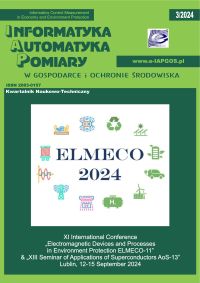MEANS OF ANALYZING PARAMETERS OF SPEECH SIGNAL TRANSMISSION AND REPRODUCTION
Olexiy Azarov
Vinnytsia National Technical University (Ukraine)
Larysa Azarova
Vinnitsia National Technical University (Ukraine)
Iurii Krak
1Taras Shevchenko National University of Kyiv, 2Glushkov Cybernetics Institute (Ukraine)
https://orcid.org/0000-0002-8043-0785
Leonid Krupelnitskyi
Vinnytsia National Technical University (Ukraine)
Anzhelika Azarova
azarova.angelika@gmail.comVinnytsia National Technical University (Ukraine)
https://orcid.org/0000-0003-3340-5701
Veronika Azarova
Borys Grinchenko Kyiv University (Ukraine)
Abstract
The article explores the design and use of the analyzer developed by the authors for investigating the quality of compression, recording, transmission, and reproduction of speech signals in audio communication channels. The peculiarities of the construction of measurement channels of a self-adjusting system are studied. Parameters for assessing the quality of channels are selected, and methods for their calculation are determined. An example of determining the quality of compression-decompression in satellite channels for transmitting audio speech is provided. A polyharmonic signal, consisting of the sum of many harmonic components with the same amplitude and phase, is proposed as the input test signal for the compressor. Such a signal approximates real speech and music signals transmitted through the channel. The actual frequency characteristic is determined at the output of the decompressor by analyzing the spectrum, which, for the MPEG Layer3 compression method, significantly depends on the bit rate of compressed data transmission. Another characteristic application of the analyzer is experiments to study the structural organization of connecting possibilities of elements in complex nominations at the phonetic level in the concept of the "golden" ratio. A hypothesis is put forward about the harmony of these words at the acoustic level. It is proved that the harmonious structure of juxtapositions should be considered as the arrangement of components of such nominations by a system of perfect relationships, among which the proportion corresponding to the division of the whole into two parts and called the "golden" ratio plays a fundamental role.
Keywords:
sound signal analysis, analog-to-digital conversion, sound signal compression, acoustic phoneticsReferences
Azarov A. D. et al.: Selection of the calculus system base for ADC and DAC with weight redundancy. Proc. SPIE 11176, 2019, 1117662 [https://doi.org/10.1117/12.2537197].
Google Scholar
Azarov O. D. et al.: AD systems for processing of low frequency signals based on selfcalibrate ADC and DAC with weight redundancy. Przegląd Elektrotechniczny 93(5), 2017, 125–128 [https://doi.org/10.15199/48.2017.05.26].
Google Scholar
Azarov O. D. et al.: Polyharmonic methods for measuring frequency characteristics of audio channels and tracts. Information Technologies and Computer Engineering 2, 2015, 23–29.
Google Scholar
Azarov O. et al.: Reconstruction of Acoustic Surfaces from Incomplete Data as an Identification Problem Based on Fuzzy Relations. CEUR Workshop Proceedings 3101, 2021, 208–226.
Google Scholar
Azarov O., Krupelnitskyi L., Rakytyanska H.: Sound field reconstruction from incomplete data by solving fuzzy relational equations. Advances in Intelligent Systems and Computing 1246 AISC, 2021, 547–566 [https://doi.org/10.15199/48.2017.05.2610.1007/978-3-030-54215-3_35].
Google Scholar
Azarova L. Ye.: Features of using computer technologies in the study of noun juxtapositions at the phonetic level. Linguistic Studies of Donetsk National University 36, 2018, 136–141.
Google Scholar
Azarova L. Ye.: Research of two-component complex nomination sat the phonetic level in the concept of the "golden" ratio. Scientific notes of Taurida National V. I. Vernadsky University. Series: Philology. Journalism 33(72), 6, Part 1, 2022, 1–6.
Google Scholar
Bispo B., Borges R.: A Cepstral Method to Estimate the Stable Optimal Solution for Feedforward Occlusion Cancellation in Hearing Aids. Journal of Communication and Information Systems 35, 2020, 113–123 [https://doi.org/10.14209/jcis.2020.12].
Google Scholar
Cherry C.: On Human Communication. A Review, a Survey, and a Criticism. Cambridge (Mass.). John Wiley & Sons, New York, London, 1972.
Google Scholar
de Lima A. A. et al.: On the quality assessment of sound signals. Proc. IEEE International Symposium on Circuits and Systems, 2008, 416–419 [https://doi.org/10.1109/ISCAS.2008.4541443].
Google Scholar
Kates J., Arehart K.: The hearing-aid audio quality index (HAAQI). IEEE/ACM Transactions on Audio, Speech, and Language Processing 24, 2015 [https://doi.org/10.1109/TASLP.2015.2507858].
Google Scholar
Kyryichuk D. L., Bolotin O. A., Liashenko O. M.: Development of a software for testing the quality of analog and digital paths of sound equipment. Scientific notes of Taurida National V. I. Vernadsky University. Series: Technical Sciences 5, 2022, 100–106 [https://doi.org/10.32782/2663-5941/2022.5/14].
Google Scholar
Schubert L.: Computational Linguistics. Edward N. Zalta (ed.): The Stanford Encyclopedia of Philosophy, 2020.
Google Scholar
State Standard of Ukraine ITU-R BS.644-1:2005 Audio Broadcasting. Quality indicators of audio signal in the chain of high-quality broadcasting of speech programs. General technical requirements and measurement methods (ITU-R BS.644-1:1990, IDT). State Standard of Ukraine, Kyiv 2007.
Google Scholar
Strods D., Smeaton A.: Enhancing Gappy Speech Audio Signals with Generative Adversarial Networks. 34th Irish Signals and Systems Conference – ISSC, 2023, 1–6 [https://doi.org/10.1109/ISSC59246.2023.10161997].
Google Scholar
Authors
Olexiy AzarovVinnytsia National Technical University Ukraine
Authors
Larysa AzarovaVinnitsia National Technical University Ukraine
Authors
Iurii Krak1Taras Shevchenko National University of Kyiv, 2Glushkov Cybernetics Institute Ukraine
https://orcid.org/0000-0002-8043-0785
Authors
Leonid KrupelnitskyiVinnytsia National Technical University Ukraine
Authors
Anzhelika Azarovaazarova.angelika@gmail.com
Vinnytsia National Technical University Ukraine
https://orcid.org/0000-0003-3340-5701
Authors
Veronika AzarovaBorys Grinchenko Kyiv University Ukraine
Statistics
Abstract views: 151PDF downloads: 139
Most read articles by the same author(s)
- Serhii Kondratiuk, Iurii Krak, Waldemar Wójcik, СROSS PLATFORM TOOLS FOR MODELING AND RECOGNITION OF THE FINGERSPELLING ALPHABET OF GESTURE LANGUAGE , Informatyka, Automatyka, Pomiary w Gospodarce i Ochronie Środowiska: Vol. 9 No. 2 (2019)
- Olexiy Azarov, Yevhenii Heneralnytskyi, Nataliia Rybko, MULTI-CHANNEL DIGITAL-ANALOG SYSTEM BASED ON CURRENT-CURRENT CONVERTERS , Informatyka, Automatyka, Pomiary w Gospodarce i Ochronie Środowiska: Vol. 10 No. 4 (2020)
- Anzhelika Azarova, Larysa Azarova, Iurii Krak, Olga Ruzakova, Veronika Azarova, INFORMATION SYSTEM FOR ASSESSING THE LEVEL OF HUMAN CAPITAL MANAGEMENT , Informatyka, Automatyka, Pomiary w Gospodarce i Ochronie Środowiska: Vol. 14 No. 3 (2024)









